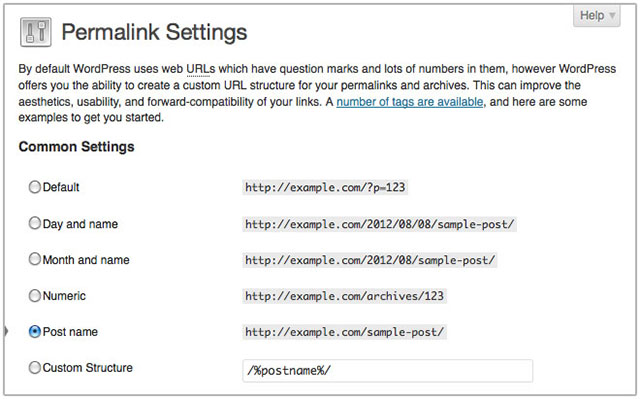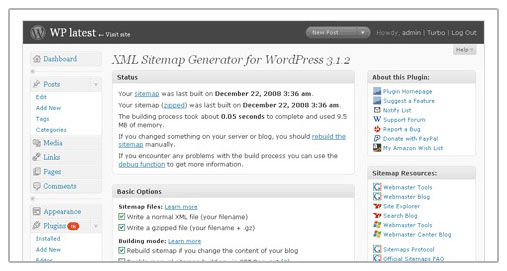A good way to rank faster for a specific keyword phrase is by having it in your URL. Buying a domain name that includes your keyword phrase is a common practice. But we do not recommend that as a long term solution. Over time, when competition gets high, your brand gets diluted in the mess of keyword rich domain names.
Furthermore, if it happens that your rankings go down one day, having a generic keyword as your root domain will make it difficult for someone to look you up. The other alternative is to have page urls that are an exact match for the keywords used on that particular page.
For example, let’s use the keyword phrase “WordPress SEO guide”.
http://example.com/wordpress-seo-guide
Given proper link juice, this page will rank relatively easier for “wordpress SEO guide” search term than an unoptimized url like example.com/?page-id=139
To optimize the urls, go to Settings → Permalinks panel and choose post-name as the settings.

It’s a fact that pages rank better than posts. That’s because in pages, the page title is pretty much same as the content title.
And if you have a post with a lot of comments, it will be harder to keep your keyword density constant. Lots of comments will dilute the keyword density over time and you may not even notice it.
And it’s a good idea to Google the topic before writing so that you can make sure no one has written that content. Unique AND relevant content ranks much faster than “me too” content.
Have at-least 1 relevant H1 tags on the page. Include your focus keyword in the H1 title.
Don’t waste the additional traffic your site will get from optimizing images. Do the following.
Crosslink unique contents only. The idea is to let Google know about similar but related content is there in your site. Use focus keywords as Anchor texts.
To make it less annoying for the user, use sparingly. The ultimate benefit for you will the that the reader is getting most value visiting your site. So don’t use it if it is going to annoy your readers.
And always make it seem natural for the reader so you are not interrupting the reading pattern of your prospects. However, if the page is a sales page, do not use cross linking at all as it can be a distraction for your prospects.
Meta tags tells search engines what the page is all about and the description is a snippet for potential visitors.

It’s a best practice to have unique meta description for each page of your site. In the above screenshot, “Social Metrics Pro is a WordPress social plugin for social media monitoring, social media analytics and social media marketing and user engagement.” is the meta description.
If possible, write meta descriptions as though its a Call To Action for users to click on the Google search results page. The more powerful your message is, the better the click through.
A robots.txt file restricts access to your site by search engine robots that crawl the web. Don’t let the bots have access to your secure pages (https) so that all the search results pertaining to your site will be clean and relevant.
XML format for sitemaps was first adopted by Google to reduce the crawling time for it’s bots. Search the WordPress plugin repository and find a suitable xml sitemaps plugin.
All of them does basically the same thing. One such plugin is Google XML sitemaps plugin. It helps you generate XML sitemaps and tells Google about new updates to your site.

Protect your rankings by preventing comment spammers from leaching out.
To safely describe a link on your blog that is pointing to another site that is known for it’s bad ranking, you could use the following
<a href=”http://badsite.org/” rel=”nofollow”>spamsite!</a>
WordPress 1.5 and above automatically assigns the nofollow attribute to all user-submitted links (comment data, commenter URI, etc).
It’s easy to do it with a built-in SEO settings of your theme. After all, you have saved a bunch of extra code required for a new professional plugin.
But the fact of the matter is, you might need a new theme one day. And that’s when the panic starts. How would you migrate your SEO settings to a new theme?
To save you from this predicament, always use a professional always-updated google-friendly wordpress SEO plugin like SEOPressor. This will save your butt in case you are going to migrate to a new theme. Not only that, but if you could find a premium seo plugin that closely watches and updates their plugin based on Google’s update, you need not worry about keeping up with Google or worrying about over-optimization.